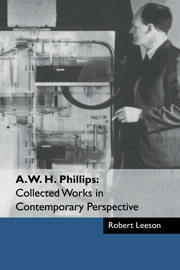Book contents
- Frontmatter
- Contents
- List of contributors
- Foreword by Arthur Brown
- Preface by Robert Leeson
- Part I Bill Phillips: Some Memories and Reflections
- 1 A. W. H. Phillips: An extraordinary life
- 2 The versatile genius
- 3 To be his colleague was to be his friend
- 4 Phillips' adaptive expectations formula
- 5 Economist – washing machine fixer
- 6 Playing around with some data
- 7 The Festschrift
- Part II The Phillips Machine
- Part III Dynamic Stabilisation
- Part IV Econometrics
- References
- Index of names
- Index of subjects
5 - Economist – washing machine fixer
Published online by Cambridge University Press: 04 May 2010
- Frontmatter
- Contents
- List of contributors
- Foreword by Arthur Brown
- Preface by Robert Leeson
- Part I Bill Phillips: Some Memories and Reflections
- 1 A. W. H. Phillips: An extraordinary life
- 2 The versatile genius
- 3 To be his colleague was to be his friend
- 4 Phillips' adaptive expectations formula
- 5 Economist – washing machine fixer
- 6 Playing around with some data
- 7 The Festschrift
- Part II The Phillips Machine
- Part III Dynamic Stabilisation
- Part IV Econometrics
- References
- Index of names
- Index of subjects
Summary
As I remember, Bill Phillips fixed my washing machine - at least, that became the family myth. My husband, Harry Johnson, brought him home to talk economics after a Cambridge dinner in hall and they walked in on my frustration with the washer. I met a slight-statured, quiet man who modestly asked if he could help. He tried something with a screwdriver which may have worked - or perhaps it didn't work - and went back to talking economics.
Phillips' visit to Cambridge was preceded by the rumour that he had started life as an engineer, intriguing information in those days of more stratified and static academic careers. And, of course, we had heard about his teaching machine that modelled a working economy in a Heath Robinson conglomeration of glass tubes through which flowed a stream of coloured water representing the national income. There was one of these machines at the LSE and soon to be one at Cambridge where Richard Stone had recently gathered a group working in applied economics. I suspect it may have been Stone's interest that prompted Phillips' visit to Cambridge; the economics faculty as a whole was not particularly observant of what went on in their subject elsewhere in the world.
The trouble with the Phillips Machine was its inflationary tendencies - the national income demonstrated a strong propensity to overflow. Perhaps as the youngest and most recently arrived member of the faculty, Harry was frequently called out to deal with a monetary crisis in the shape of a pink cascade pouring down the stairway from the Department of Applied Economics.
- Type
- Chapter
- Information
- Publisher: Cambridge University PressPrint publication year: 2000



